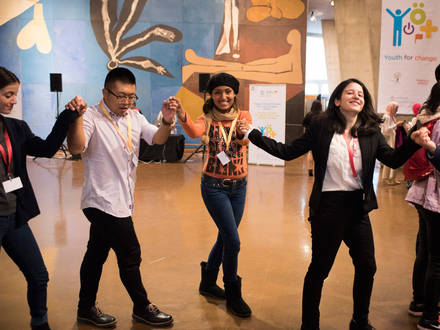International Youth Day 2017
Message from Irina Bokova, Director-General of UNESCO
The world has never been so young and it is getting younger every day. The development of any society depends on how well it nurtures its young women and men, how well they are supported.
In 2015, there were 1.2 billion young people in the world, and more than 600 million lived in fragile and conflict-affected contexts. Young people carry the heaviest burdens of conflict and violence -- they are also essential for any lasting solution leading to peace.
Download the message in PDF format
English ǀ Français ǀ Español ǀ Русский ǀ العربية ǀ 中文
Youth Participation & Empowerment
Despite the fact that they are among the most affected by the multiple and often interlinked forms of violence, youth play active roles as agents of positive change.
There are currently 1.8 billion young people between the ages of 10 and 24 in the world. This is the largest youth population ever. But 1 in 10 of the world’s children live in conflict zones and 24 million of them are out of school. Political instability, labour market challenges and limited space for political and civic participation have led to increasing isolation of youth in societies.
Security Council Resolution 2250 on Youth, Peace and Security represents an unprecedented acknowledgement of the urgent need to engage young peacebuilders in promoting peace and countering extremism, and clearly positions youth as important partners in the global efforts.
UNESCO’s unique cross-sectoral response to the Security Council Resolution puts young women and men at the very heart of addressing the root causes of violent extremism. The Organization ensures that young people are provided with the skills and support required to lead the global movement towards the creation of a peaceful world.
UNESCO’s Youth Community
UNESCO’s online youth community aims to provide young people with a tailored space to find out about UNESCO’s youth actions across all sectors and opportunities to get involved with the organization’s work.
Join at www.facebook.com/UNESCOyouth
#YouthOfUNESCO is a storytelling initiative about young women and men from all over the world who are leading exceptional initiatives or who have an exceptional perspective to share in an area related to a UNESCO theme. On International Youth Day, read our #YouthOfUNESCO stories about young people engaged in peace-building initiatives in their countries and communities.
10th UNESCO Youth Forum
UNESCO Paris, France, 25-26 October 2017
The 10th UNESCO Youth Forum will take place at UNESCO’s Headquarters in Paris on 25 and 26 October 2017. The Forum will bring together young change-makers from all over the world to discuss “Rethinking youth engagement with UNESCO”.
It will look at ways in which UNESCO can engage with youth to ensure they are treated as actors and partners, and not just mere beneficiaries of our work.
JOIN US
Networks of Mediterranean Youth (NET-MED Youth)
- NET-MED Youth is a unique three-year project implemented by UNESCO and funded by the European Union with the aim of building the capacities of youth, enhancing networking among them, engaging them in dialogue with national stakeholders and in the development and revision of public policies.
Related Information
Links
- Sustainable Development Goals: 17 Goals to Transform our World
- International Day of Women and Girls in Science (11 February)
- UN Interagency Network on Youth development
- UN Secretary-General's Envoy on Youth
- World Heritage Volunteers, to mobilize and involve young people in World Heritage preservation and promotion
- UN Website for International Youth Day
Publications
- “Doping” Education Brochure
- Global Education Monitoring Report
- How youth drive change. UNESCO Courier (July-September 2011)
- The UNESCO Youth Forum. Celebrating a Decade of Youth Participation
- World Youth Report 2016 on Youth Civic Engagement
- More Publications




